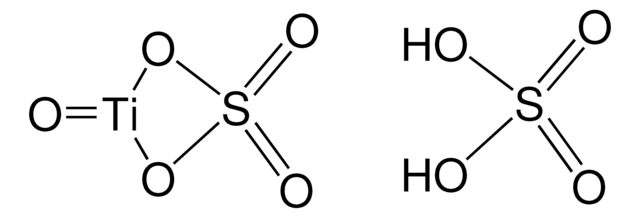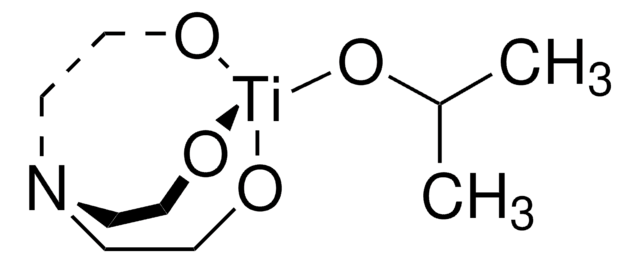14007
Potassium titanium oxide oxalate dihydrate
Synonyme(s) :
Dipotassium oxodioxalatotitanate(IV) dihydrate, Oxotitanium potassium ethanedioate hydrate (1:2:2:2)
About This Item
Produits recommandés
Forme
solid
Niveau de qualité
Pertinence de la réaction
core: titanium
reagent type: catalyst
Chaîne SMILES
O.O.[K+].[K+].[O-]C(=O)C(=O)O[Ti](=O)OC(=O)C([O-])=O
InChI
1S/2C2H2O4.2K.2H2O.O.Ti/c2*3-1(4)2(5)6;;;;;;/h2*(H,3,4)(H,5,6);;;2*1H2;;/q;;2*+1;;;;+2/p-4
Clé InChI
PGGRHIGITIPOBF-UHFFFAOYSA-J
Description générale
Application
- A catalyst to synthesize chromene derivatives via three-component condensation reaction of aromatic aldehydes, malononitrile, and resorcinol/ naphthol.
- An electrolyte to functionalize the surface of aluminum alloy with TiO2 layer by plasma electrolytic oxidation (PEO).
PTO can be used as a precursor to synthesize titanium dioxide (TiO2) nanoparticles.
Code de la classe de stockage
13 - Non Combustible Solids
Classe de danger pour l'eau (WGK)
WGK 3
Point d'éclair (°F)
Not applicable
Point d'éclair (°C)
Not applicable
Équipement de protection individuelle
Eyeshields, Gloves, type N95 (US)
Faites votre choix parmi les versions les plus récentes :
Certificats d'analyse (COA)
Vous ne trouvez pas la bonne version ?
Si vous avez besoin d'une version particulière, vous pouvez rechercher un certificat spécifique par le numéro de lot.
Déjà en possession de ce produit ?
Retrouvez la documentation relative aux produits que vous avez récemment achetés dans la Bibliothèque de documents.
Les clients ont également consulté
Notre équipe de scientifiques dispose d'une expérience dans tous les secteurs de la recherche, notamment en sciences de la vie, science des matériaux, synthèse chimique, chromatographie, analyse et dans de nombreux autres domaines..
Contacter notre Service technique











